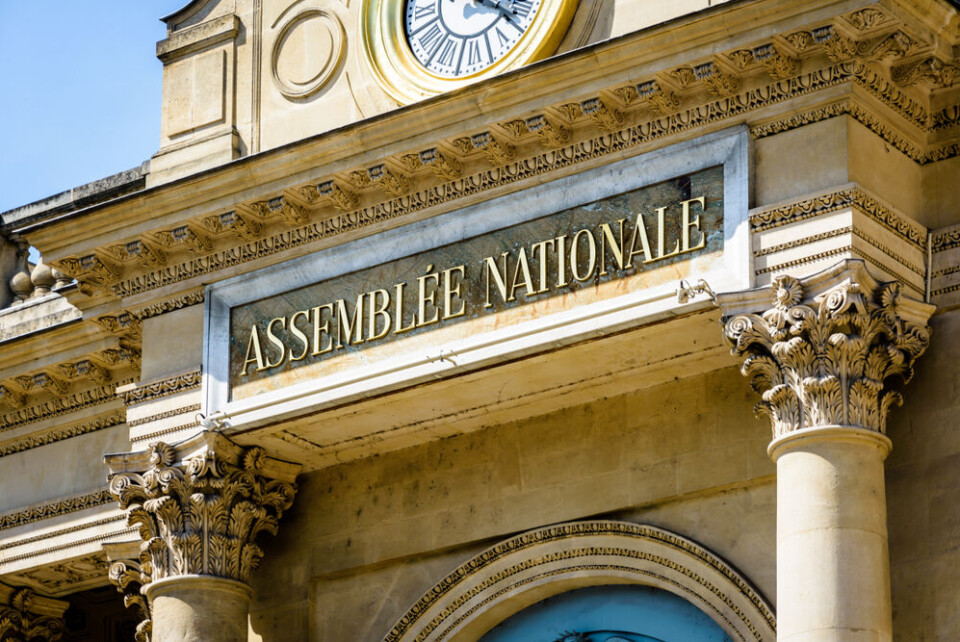-
French crisps brand gains global attention after Dua Lipa post
Singer posted photo of her shopping basket and the only food items were Brets crisps in braised chicken, honey mustard, and ‘Fromage du Jura’ flavours
-
Why supermarkets are urging shoppers to buy French leeks
Try our French classic leek vinaigrette recipe
-
New bill targets skiers under influence of alcohol or drugs
There are not currently any specific rules on skiing while under the influence
Mental health, Julian Assange: What French MPs are debating this week
Debates on prison reforms, green energy and France’s soft power influence around the world will also take place in the Assemblée nationale

Our roundup of topics and laws that will be discussed in France's lower house, the Assemblée nationale, this week.
Tuesday, February 1
Soft power:
MPs will debate a diplomatic roadmap for France’s direction and challenges over the coming years. The plan, called the “Feuille de route de l'influence de la diplomatie française”, lays out the country’s strengths and weaknesses.
It includes highlighting the country’s Soft Power 30 ranking, which is put together by media company Portland and rates countries’ influences in education, language, tourism, etc.
France was ranked number one in the world during the last review, which took place in 2019.
The Ministry of Foreign Affairs has laid out ten key elements to maintain and strengthen, such as promoting multilateralism and humanism, sticking to the country’s core values, embracing and nourishing diversity and being “resolutely European.”
The plan was unveiled by Minister of Foreign Affairs Jean-Yves Le Drian on December 14. “In an increasingly competitive world, in which traditional definitions of expressions of power tend to disappear, we needed to think about the meaning, objectives and tools of our influential and cultural diplomacy,” he said.
Green transition:
The European Union’s strategy to end carbon-fuelled electricity by 2050 will be discussed during the same public hearing.
The EU’s roadmap aims to accelerate investments in new buildings and limit price increases of electricity to facilitate the transition.
The plan was published on December 15, 2011.
Prison reforms:
MPs will debate the measures put forward in a 400-page long investigation on the state of French prisons. The report was tabled by Philippe Benassaya of the right-wing party Les Républicains.
It lays out 55 proposals to tackle overpopulation in prisons, to improve prisoner conditions, develop specific attention care treatments, facilitate reinsertion of prisoners into society and offer better working conditions to prison staff.
Wednesday, February 2
MPs will discuss the evolution of the psychological consequences of the coronavirus pandemic - and the measures the government could take to tackle the problem.
The government has budgeted €12million a year as part of a policy to provide better access to consultations with psychiatrists, as mentioned by Minister of Health Olivier Véran in his latest speech on the issue on September 27, 2021.
The initiative, which is open to everyone in France over the age of 3, is called MonPsySanté, and is set to be launched in spring. More information can be found here.
The first session is to cost €40, and follow-up sessions €30, all of which should be fully reimbursed through the French healthcare system.
Thursday, February 3
Additives in charcuterie products linked to cancer:
MPs will continue to examine a law aimed at outlawing the use of nitrate additives in several charcuterie products, as studies show they can increase the risk of cancer.
The proposition was brought by Richard Ramos of the centre-right party Mouvement démocrate (MoDem).
Postal voting:
They will also continue to examine a law to reintroduce postal voting. Postal voting was abolished in 1975 in France and has often been raised in debates over the last couple of years because of soaring voter absenteeism and people staying at home due to the coronavirus pandemic.
Diversity in parliament:
The diversity in representation among members of the Parliament has been a rising topic in French politics. MPs will discuss a proposal resolution that aims to get the government to consider a reform on parliamentary elections, in an effort to better represent citizens.
The resolution was put forward by Isabelle Florennes and members of the MoDem party.
Citizens' collectives:
MPs will discuss a proposal to rely more on specially formed collectives of citizens when making new policies. It is hoped this method will become a bedrock of the constitution.
Several citizens’ collectives have already been formed under the current administration, including ones tasked with looking into the Gilets Jaunes’ protests, and another to examine France’s climate laws, called the Convention Citoyenne pour le Climat.
The resolution was put forward by Sylvain Waserman and members of MoDem.
Friday, February 4
Julian Assange:
A coalition of high-profiled MPs (François Ruffin, Jean Lassale and Cédric Villani) have asked the government to grant political asylum to Wikileaks founder Julian Assange. MPs will discuss the proposal.
Julian Assange faces extradition to the US after he published a series of leaked documents from several secret services agencies uncovering revelations of misconduct. He has been in a London prison since 2019.
The proposal highlights comments from France’s Minister of Justice Eric Dupont-Moretti, who qualified the 175-year sentence Assange is facing as “undeserving and unbearable,” as well as comments from President Emmanuel Macron who stated that “all liberties should be protected.”
Blank ballots:
MPs will discuss a proposed law to count blank ballots among casted ballots in presidential elections (Jean-Félix Acquaviva, Libertés et Territoires.)
Related stories
Plastic, additives, conversion therapy: This week in French parliament
France’s Citizens’ climate body explained
Mental health appointments to be made more affordable in France
























